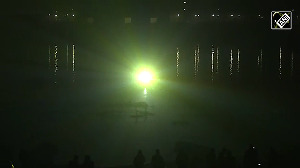 The much talked about Rs. 11,500 crore (Rs. 115 billion) share sale of state-run Oil and Natural Gas Corp has been deferred again and is unlikely to hit the market before mid-August.
The much talked about Rs. 11,500 crore (Rs. 115 billion) share sale of state-run Oil and Natural Gas Corp has been deferred again and is unlikely to hit the market before mid-August.The public offer in which government plans to sell five per cent (427.77 million shares) was originally planned for 2010-11 fiscal but was deferred to April 5 as the company did not have adequate number of independent directors on its board to meet the market regulator Sebi's listing norm.
It was then scheduled for July but it has again been deferred, a senior government official said in New Delhi.
"This not the right time for the follow-on public offer. It is now being planned to happen after ONGC reports its first quarter earnings," he said adding the Q1 numbers will give out the government mood on fuel subsidy sharing.
Oil and gas producers like ONGC have to make good a part of the revenues that fuel retailers lose on selling diesel, domestic LPG and kerosene at government-controlled rates.
The discount that ONGC gives to IOC, BPCL and HPCL on crude oil it sells to them is decided on a quarter-to-quarter basis.
"The entire system is ad-hoc and lacks transparency. For investors, this is a matter of concern. And without clarity on subsidy sharing mechanism, it would have been futile
Post-FPO, the government's stake in ONGC would come down to 69.14 per cent from the current 74.14 per cent.
Even ONGC has opposed the ad-hoc fuel subsidy sharing mechanism.
"The upstream companies' share of under-recoveries (revenue loss) has been increased from one-third (33.33 per cent) to 38.75 per cent for the year 2010-11 and 46.89 per cent for Q4 of FY-11," ONGC Chairman and Managing Director A K Hazarika recently said in his letter to Oil Secretary G C Chaturvedi.
As a result, ONGC's net realisation on crude oil sales translated into just USD 38.75 per barrel, the lowest in the last eight quarters, he said. "It has not only adversely affected our profits and cash flows, but also investor sentiment, reflected in fall in market capitalisation from Rs. 265,520 crore (Rs. 2,655.2 billion) to Rs. 228,860 crore (Rs. 2288.6 billion), i.e. by 14 per cent."
Hazarika stated that ONGC should get a net crude price of $58-60 per barrel to meet its planned capital investments of Rs. 30,000 crore (Rs. 300 billion).
He said upstream firms ONGC, Oil India and GAIL India should be asked to bear one-third of under-recoveries if crude oil stays under $70 per barrel.
But if it touches $75 a barrel, their share should come down to 30 per cent. This share should progressively fall to 25 per cent if crude touches $100, he added.











 © 2025
© 2025